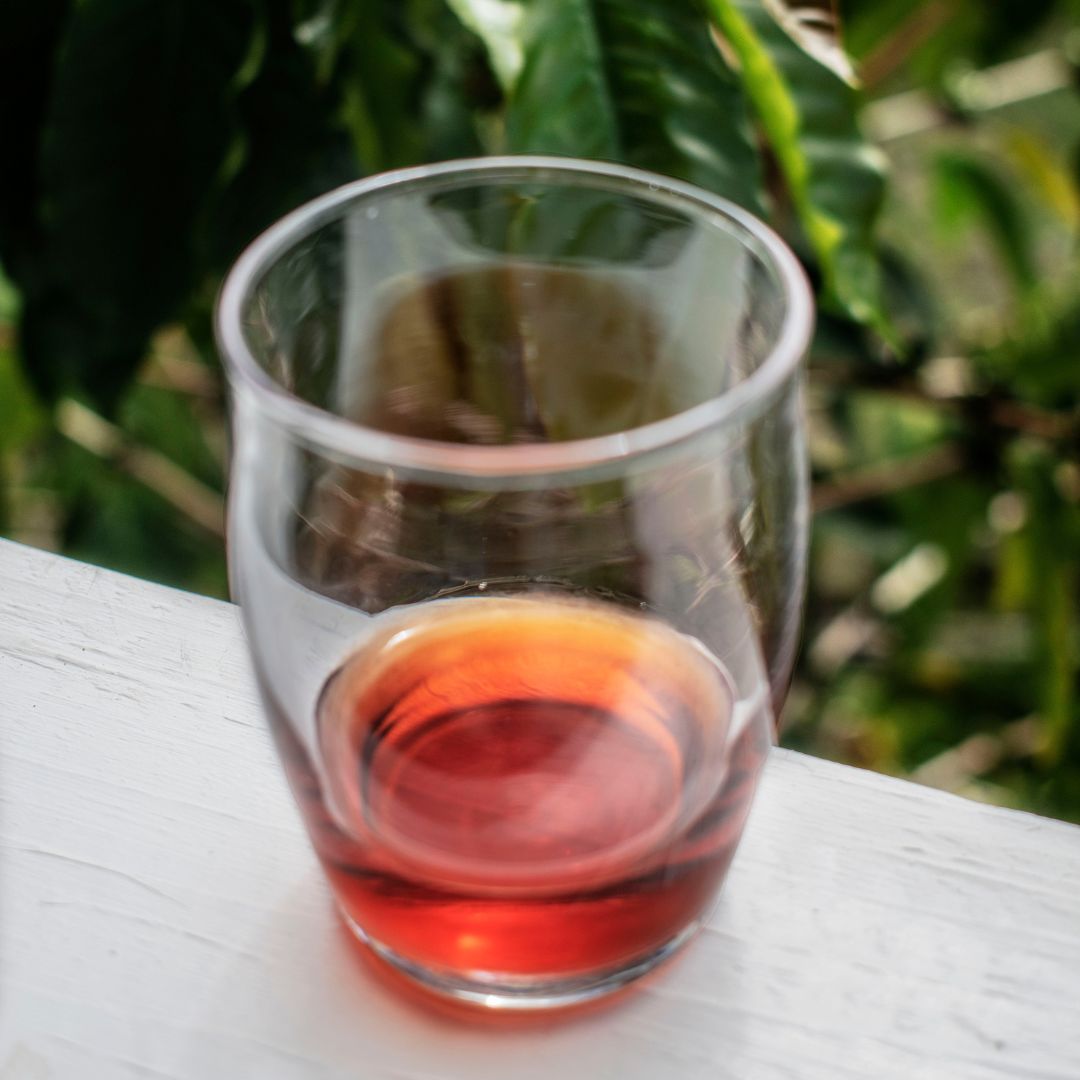Have you tried Cascara?

We discovered cascara earlier this year on our trip to Kona for the Kona Coffee Farmers Association coffee expo and to meet up with fellow Ashe Roaster, Jean Orlowski. We attended a roaster’s workshop put on by Ashe Industries that Jean hosted at his plantation, Hala Tree Farm. We roasted together and sampled that delicious fresh-roasted 100% Kona coffee, but while at this farm, we also were able to sample some amazing cascara tea.
Cascara really isn’t a tea – but it isn’t really coffee as we know it – some refer to it as coffee cherry tea.
The coffee part: Cascara comes from the coffee plant family, coffea. As with other plants, coffee plants produce flowers, which then produce fruit (known as the coffee cherry) and within the fruit are seeds (coffee beans). The red, or sometimes yellow depending on the region, fleshy part of the cherry is referred to as the “skin”. The pulped skins are collected after the coffee beans have been removed from the cherries. This skin, when dried is cascara. The word “cascara” means “husk”, or “peel”, or “skin” in Spanish.
The tea part: Although it comes from the coffee plant, cascara tastes nothing like brewed coffee. It relates more to an herbal tea since it is brewed from dried fruit giving it a natural sweetness and often has a tangy or floral element, much like hibiscus. Like tea, it contains less caffeine than brewed coffee. On the Square Mile Coffee Blog, in the post, "Cascara and Caffeine” co-founder Anette Moldvaer explains that after numerous questions from customers about the caffeine content in cascara, Square Mile sent a sample to a lab in Germany to test exactly how much caffeine the drink contains. Moldvaer states, “Surprisingly, we found the caffeine content to be fairly low. Even at the strongest, longest brew, the caffeine content of cascara came in at 111.4 mg/L compared to the broad range of about 400-800 mg/L in brewed coffee.
So it’s like a hybrid coffee-tea.
Just like roasted coffee, the variety of cherry, where it is grown, and how it is processed directly affect its flavor profile, its body, and its acidity. It can be brewed hot or cold with each method bringing out different flavors, and tea-like due to its floral flavor and lower caffeine content.
But… it’s not coffee or tea.
While it does come from the coffee plant coffea, coffee itself comes from the seeds. Cascara, as stated earlier, comes from the cherry part of the plant - so not coffee.
Because it is brewed from the fruit part instead of the seed, it is more like tea, but because it is not of the plant family Camellia Sinensis or brewed from the leaves of the plant it cannot be classified as a true tea - so not tea.
Tisanes are often thought of as tea, but actually are not. Instead they are herbal infusions that use the leaves, bark, roots, and cherries of a plant, but not the Camellia Sinensis plant, such as peppermint or chamomile. They are naturally caffeine free - so not a tisane.
Cascara really is in a league all of its own.
It also has some health benefits.
It’s a great source of antioxidants – which boost the body’s immune system, reduce inflammation, and improve overall health – found in pomegranates, blueberries and cranberries, known to contain high amounts of antioxidants, cascara beats them all as reported here.
Another benefit is that its lower caffeine content. It's a gentle stimulant. At just 25% of a regular cup of coffee, you’ll feel a little pick-me-up, but without the jitters.
Lastly, it promotes mental health, and not just from the comfort of a good tasting drink in hand. According to the British Journal of Nutrition, cascara coffee cherries promote healthy aging of the brain, memory and feelings of goodwill and happiness through support of brain-derived neurotrophic factor (BDNF).
If you haven’t yet, you really should try it! You can order some from Hala Tree Farm., but I am sure it is available other places as it is gaining in popularity.
To brew: Much of it is to taste - you just need a starting point ratio and then you can adjust to suit you. Cascara is very forgiving.
- To your FRENCH PRESS add
- 5 g for every 100 ml of water (or 50 g for 1 L)
- filtered water heated to boiling.
- Let steep for 4 minutes.
- Enjoy hot or over ice.
One final note. Please don’t confuse Cascara made from coffee cherries with Cascara Sagrada, which is a shrub. The dried bark of the cascara buckthorn plant grows within the Pacific Northwest and is used as a dietary supplement to combat constipation.